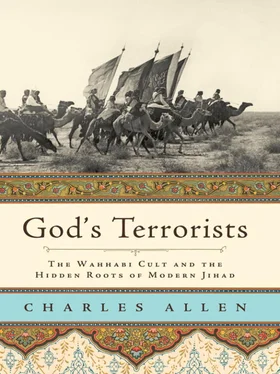gripped by
Wahhabism, desert crossings
unification as Saudi
Arabia, British
involvement in, Indian links with, Wahhabi veterans in
Arabic
Arab-Israeli war (1973)
Arabs, ‘Arabs’
Arafat, Yasser
Aramco
Argyll, Duke of
Army of Retribution
Army of the Indus
Arrah
Artaiba
Artawiyyaa
Asar Mahshar (Signs of the Last Day)
Ataturk, Kemal
Attock
Aurangzeb, Emperor
Austria-Hungary
Austrians
Azimgargh
Azzam, Ibrahim
Azzam, Sheikh Abdullah
Babrhai Mullah
Badakshan
Badshah, Sahib Miangul Abdul Wadud
Badshah Shah Alam, Emperor
Baghdad
Bahadur, Khan
Bahadur Shah, Emperor
Bahrain
Baiat al-Imam
baiat
Bajour
Bajourees
Bakht Khan, Subedar Muhammad
Balakot, battle of
Baluchistan
Bamian
Bangladesh
Bannu
Barakat (Palgrave’s companion)
Bard, battle of
Bareilly
Barrackpore
Bashir Ahmad Khan
Basra
Batalvi, Maulvi Muhammad Husain
Bay of Bengal
Bazar
Becher, Major
Bedouin
Belgium
Bell, Gertrude
Bellew, Dr Henry, description of mullahs
Benares
Bengal, beginning of
British rule, Christian
missionaries in, Titu Mir’s
revolt, weavers join
Wahhabis, becomes province
during Sepoy Mutiny
Wahhabi networks
Bengal Civil Service
Bengal Native Infantry, and
Sepoy Mutiny
mutinous 55th
Regiment
Beni Temin tribe
Berar
Bharatpore
Bhopal
Bihar
Wahhabi networks
bin Baz, Abdul Aziz bin Abdullah
bin Hanbal, Ahmad
bin Laden, Muhammad
bin Laden, Osama
Wahhabism
turns against Wahhabi
establishment, alliance with
Taliban, assumes
leadership, interpretation of
Islam
bin Rahmatullah, Miskin
Binnori, Maulvi Mohammad Yusaf
Black Mountains
Blavatsky, Madame
Blood, General Bindon
Bokhara, Emir of
Bolan Pass
Bombay
Boyle (engineer)
British
consolidate rule
indigo planters, intervention in
Afghanistan, jihad
against
length
of dominion, opinions of
Muslims, failure against
dervishes, casualties
courage, and Ibn Saud
armed struggle
against, in Egypt
British Empire
British Iraq petroleum Company
Buddhists
Buner, tribes
topography, Syed Ahmad takes
refuge in, influence
of Akhund of Swat
appearance of ‘the Mad
Fakir’, map
Fanatics expelled
Bunerwals
Burckhardt, J. H.
Burden, Lieutenant
Burdwan
Burjan, Hajji Mullah
Burke, Edmund
Burke, Jason
Burma
Burrendo
Burton, Sir Richard
Bushire
Butcher, Flora
Buxar
Cairo, Al-Aqsa
mosque, Al-Azhar
University Calcutta
during Sepoy Mutiny
murder of Justice Norman
Sunni convocation
Canning, Lord
Carnac, Charles
Carnatic
Caroe, Sir Olaf
Cawnpore
Central Asian Society
Ceylon
Chakdara
Chamarkand
Chamberlain, Brigadier (later Major-General) Neville
Chamla valley
Chamlawals
Chechnya
China
Chitral
Christians
‘Nazarenes’
missionaries
hostility towards
Byzantine Christendom
fundamentalists, evangelical
waning power
Chuprah
Churchill, Winston
CIA
Civil and Military Gazette
Constantinople
Cotton, Major-General Sir Sydney
Cox, Sir Percy
Curzon, Lord
Dagestan
Daggar
Daily Telegraph
dak
Dalhousie, Lord
Damascus
dar ul-Islam, in Medina
in Mahabun Mountain
in Narkulbaria, in Delhi
in Thana Bhawan
and British rule, in
Swat, in Afghansistan, in
Sudan, outside Heart
Dar ul-Ulum Deoband Madrassah
Daran Pass
Dargai Heights, battle of
Dariyah
de Corancez, Louis Alexandre Olivier
Deane, Major Harold
Deccan
Deen Muhammad
Delhi
Madrassah-i-Rahimiya
Akbar-abadi mosque, Red Fort
sixteenth-century Sultans
‘Delhi-ites’
Jamma Masjid
Sunni mullahs, Delhi
College, British Resident
during Sepoy Mutiny
fatwa signed, dar ul-Islam, and Wahhabi trials
Sunni convocation, heir to throne
Delhi Durbar
Delhi Mail
Delhi Ridge
Deoband movement
see also Dar ul-Ulum
Deoband Madrassah
Deobandi, Mullah Mahmood
Dher
Dinapore
Dir
Dogras
Doughty, Charles
Durand Line
Dutch East India Company
East Africa
East Bengal
East India Company
establishes rule in India
establishes Delhi College, invades
Afghanistan, annexes Oude rule ended
Edwardes, Sir Herbert
description of mullahs
brings Wahhabis to trial
Edwards, Mr
Egypt
Grand Mufti of, plan
to liberate, Al-Qaeda
operations in
Egyptians
Elahi Baksh
Elahi Bux, his sons
Elgin, Lord
Elliott-Lockhart, Lieutenant P. C.
Elphinstone, Mountstuart
Elsmie, Judge
English language
Eyre, Major Vincent
Faisal, King
Faiyyaz Ali
Faraizi
Farhat Husain
Faridoon
Farquharson, Mr Justice
Fatah Ali
Fatima, tomb desecrated,
fatwas, against Wahhabis
Delhi
on British rule, Deobandi
against women drivers
Defence of the Muslim Land
Bin Laden issues
Fazal-ur-Rahman, Maulana
fedayeen
Feisal, Prince
Ferozepore
Finati, Giovanni
Findlater, Piper
firearms
Firoze Shah, Prince
First World War
Fort Jamrud
Forward Policy
Founding Committee of the Muslim
World League
France
Fraser-Tytler, Sir Kerr
French
Gadhafi, Colonel
Gaduns
Ganges River
Gangohi, Rashid Ahmad
Gardner, Colonel Alexander
Garrett, Mr
Garvock, General
Gaya
George V, King-Emperor
Germany
Ghaffur, Abdul, Akhund of Swat, roles in Ambeyla
Campaign
British perceptions of death, squabbling heirs
Ghalib Bey
Ghani Khan
Ghazan Khan, Daffadar
ghazis
Ghazni
Ghilzais
Ghulam Masum
Ghulam Rasul (Hajji Abdul Haq)
Gilgit
Gill, Hope
Golconda
Gor
Gordon Highlanders
Gordon, General
Greece
Gujarat
Gulf War
Gurkhas
Guru mountain range
Gwalior
Habibullah, Amir
Haddah, Mullah of
Hadith
pronouncement on jihad, story
concerning Nejd, and sharia
teachers of
Wahhabite interpretation and influence of Western knowledge, and innovation
Hail
Hajj
Hajji
Halliday, Frederick James
Hamas
Harakat-i-Inqilab-i-Islami
Harb
Hasan, Muhammad
Hashemite dynasty
Hastings, Warren
Hazara
Hazara Field Force
Hazaras
Hedayut Ali, Subedar
Hekmatyar, Gulbuddin
Henry VII, King
Henry VIII, King
Herat
Hijaz
hijra
Hijrat Movement
Himalayas
Hinduism, caste system
contact with Islam
Hindus, in
Mahabun, hostility towards
fundamentalists
in Java, Brahmins, and
annexation of Oude, and
Sepoy Mutiny
kidnapped by Wahhabis
assessors, maharajas
salute George V, majority rule
by Hindustani Fanatics
established in
Sittana, equated with
Wahhabis, role in Sepoy
Mutiny, British move
against, unauthorised
peace deal with, and Frontier conflicts
volunteers join
Читать дальше












